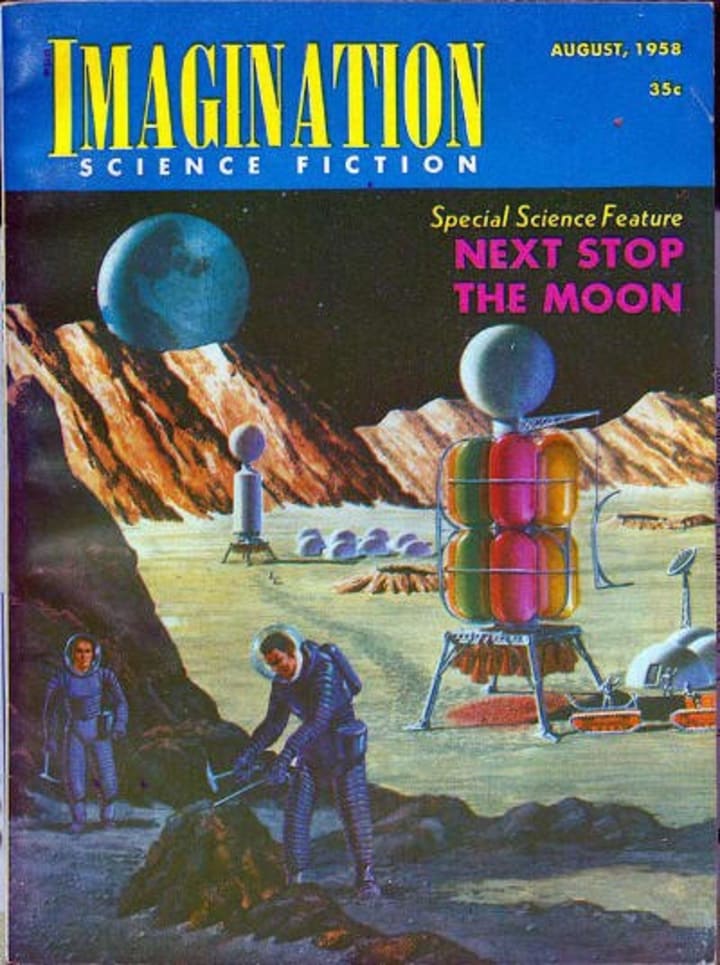A Brief History and Survey of Science Fiction
How much do you know about the highly popular genre known as science fiction? After reading this article, you should know a lot more about sci-fi.

What is science fiction?
“Science fiction is a genre of speculative fiction that typically deals with imaginative and futuristic concepts such as advanced science and technology, space exploration, time travel, parallel universes, and extraterrestrial life.”
Science fiction is often called “sci-fi” or “SF” and is a genre of fiction literature based in science, but whose content is imaginative. In support of its plotlines, characters, themes, and settings, science fiction relies heavily on scientific principles, theories, and facts, as opposed to fantasy fiction’s approach.
Science fiction stories are often about the science and technology of the future. They may also include a human element by illustrating what the effects will be on us in the future of happenings, scientific developments, and discoveries.
Is science fiction true or false?
Since science fiction, as the name indicates, is made up of fictional stories created from someone’s imagination, they are inherently not true in a literal sense. The same goes for all other fiction genres, such as fantasy, romance, mysteries, crime thrillers, etc. These are the opposite of works based on facts, classified as “nonfiction.”
How is fantasy different from science fiction?
“Fantasy is a genre of speculative fiction set in a fictional universe, often inspired by real-world myth and folklore. Its roots are in oral traditions, which then became fantasy literature and drama. From the twentieth century, it has expanded further into various media, including film, television, graphic novels, manga, and video games.”
As you can tell from the above description of fantasy, there does appear to be some overlap between science fiction and fantasy, especially when you consider how science fiction stories often take place in a “fictional universe”, as well. And what about the Harry Potter novels and movies, you may wonder? Harry Potter is fantasy, not science fiction.
Who invented the science fiction genre?
Many literary scholars say that Mary Shelley invented the science fiction genre when, as a teenage girl aged nineteen, she wrote the novel, Frankenstein. However, others believe that H.G. Wells, along with Jules Verne, pioneered science fiction. H.G. Wells was known as “the Father of Science Fiction,” or “the Shakespeare of Science Fiction.” Moreover, according to the award-winning author John Crowley, a 400-year old novel called Work published in 1616, was the first-ever science fiction book.
When did the term “science fiction” become popular?
"The term science fiction was popularized, if not invented, in the 1920s by one of the genre’s principal advocates, the American publisher Hugo Gernsback. The Hugo Awards, given annually since 1953 by the World Science Fiction Society, are named after him. "
Why is sci-fi so popular?
Science fiction primarily owes its popularity to the fact that it includes elements from various other genres with which people are familiar, and then mixes in speculation about the future which excites the imagination.
The popularity of science fiction began to explode in the year 2000, and the genre has grown increasingly popular since then as a mainstream form of entertainment. Science fiction books, movies, and video games are now enjoyed worldwide and have had a significant impact on popular culture.
What are some classic elements of a science fiction story?
- Time travel
- Teleportation
- Mind control, telepathy, and telekinesis
- Aliens, extraterrestrial lifeforms, and mutants
- Space travel and exploration
- Interplanetary warfare
- Parallel universes
- Fictional worlds
- Alternative histories
- Speculative technology
- Superintelligent computers and robots
What are some of the best science fiction movies of all time?
Film critics may disagree on what are the best sci-fi movies of all time, but it’s hard to go wrong using this list from Thrillist of the Top Ten science fiction movies:
1. 2001: A Space Odyssey (1968) “A work of boundless inventiveness and imagination, Stanley Kubrick’s 1968 film aims at nothing less than depicting the process of human evolution.”
2. Planet of the Apes (1968)
3. The Fly (1986)
4. Brazil (1985)
5. E.T. the Extraterrestrial (1982)
6. Frankenstein (1931)
7. Alien (1979)
8. Star Wars (1977)
9. Children of Men (2006)
10. Solaris (1972)
Note: You can find Thrillist’s full list of the Top 50 science fiction films of all time here.
What are the best science fiction books of all time?
Again, different critics may come up with a different list, but here are the Top 10 science fiction books of all time, according to The Planets:
1. Frankenstein by Mary Shelley
“Mary Shelley’s “Frankenstein” was published in 1818, making it one of the oldest books on this list. This timeless masterpiece is considered a classic in two genres. It’s a staple in the collection of science-fiction fans as well as lovers of horror. It deals with ethics in science and what happens when mankind goes too far from ambition and curiosity."
2. Nineteen Eighty-Four by George Orwell
“Some of the best science fiction takes a look at the possible future and how it could be negatively affected by technology. “Nineteen Eighty-Four,” tells of a dystopian future where government lies and propaganda rule the day. Few books have had such an impact on the culture and psyche of the human race as this still-relevant, cautionary tale by Orwell.”
3. Dune by Frank Herbert
“Dune is just one of many novels on this list that have been adapted for the silver screen. This epic space saga is filled with political intrigue, mysticism, and adventure. Herbert created a coherent and complex universe for this grand space opera to take place in.”
4. The Time Machine by H.G. Wells
“This seminal work by H.G. Wells is the foundation and inspiration for almost every time-traveling story since 1895. It tells the story of a time traveler who goes to the future to find a world in ruin. There is no advanced society, only a dying planet, war, and a mysterious race called the Morlocks.”
5. War of the Worlds by H.G. Wells
“War of the Worlds was one of the first science-fiction books to deal with the concept of alien invasions. It set a high bar for all of the invasion novels and movies that would follow. Orson Welles’ 1938 radio presentation of this story was said to have caused mass panic from listeners who believed it to be a newscast.”
6. Brave New World by Aldous Huxley
“Huxley weaves a fascinating tale of a utopian future that isn’t as great as it seems. Things seem to run perfectly thanks to genetic manipulation, a heavy dose of medication, and a caste system that no one can escape from.”
7. 20,000 Leagues Under The Sea by Jules Verne
“Jules Verne was, in many ways, ahead of his time. His adventure stories and early science-fiction works seemingly predicted many future inventions and technological achievements. This novel tells the tale of Captain Nemo in his fantastic submarine, the Nautilus. The ship is surprisingly modern considering the 1870 publishing date of this book.”
8. Journey To The Center Of The Earth by Jules Verne
“This is one of Jules Verne’s more fantastic stories. A German professor, Otto Lidenbrock, discovers a passage into the center of the planet. Along with his nephew, he discovers an amazing underground world inhabited by prehistoric creatures.”
9. I, Robot by Isaac Asimov
“Asimov describes the complex nature of mankind’s relationship with his own creations. This novel affected an entire generation’s idea of what robots are and what they could be. Tropes and concepts from this novel still show up in modern-day works of science fiction.”
10. Slaughterhouse-Five by Kurt Vonnegut
“Author Kurt Vonnegut survived the WWII bombing of Dresden by hiding in a slaughterhouse. This was the clear inspiration for the title of his seminal novel. This strange tale follows Billy Pilgrim as he experiences his life in a non-linear way after contact with aliens.”
Note: You can find The Planets’ full list of the Top 100 science fiction books of all time here.
What was considered the “Golden Age” of science fiction writing?
“In the history of science fiction, the Golden Age follows the “pulp era” of the 1920s and 1930s and precedes New Wave science fiction of the 1960s and 1970s. The 1950s are a transitional period in this scheme; however, Robert Silverberg, who came of age in the 1950s, saw that decade as the true Golden Age.”

I am a big fan of science fiction myself. Maybe you are too. If you’re not familiar with some of the outstanding works of science fiction, now is a good time to give some of these great stories a look-see.
The lists of movies and books above provide you with a great place to start your sci-fi journey. You’ll find science fiction to be not only thought-provoking but extremely entertaining as well. Enjoy!
References:
Thrillist, The Planets, Wikipedia, Wikimedia, Britannica, The Guardian, Forbes, Goodreads, Open Culture, The Atlantic, The Conversation, Masterclass, Wired, Literary Terms, Sage Journals, Merriam-Webster, Attribution Generator
__________________
Thanks for reading. Copyright Terry Mansfield. All rights reserved.
About the Creator
Terry Mansfield
Trying to be the best writer I can be. Specialist in eclecticism.






Comments
There are no comments for this story
Be the first to respond and start the conversation.